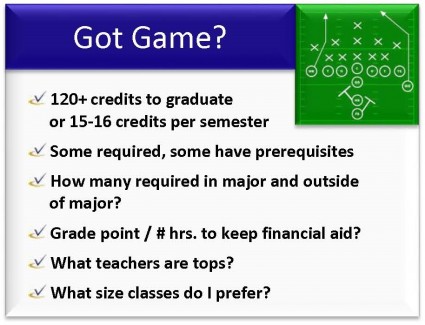How to Win at College: Game On!
Will you be starting college this fall? That’s really exciting. After all, going to college is a key milestone in life. To reach this milestone means that 12 magical years have passed from your very first day of kindergarten to high school graduation. During your elementary school years, your parents may have kept track of your growth by marking your height on a doorframe on your birthday.
Your physical growth is just one measure of how much you’ve changed. Consider, for example, how much you’ve grown academically. How was that measured? Well, certainly not with pencil marks on a doorframe. Up until now, your academic growth was measured by your preparation for the transition from high school to college. As a result, the courses you took in school were more or less prescribed by our education system — designed to ensure that you met the criteria for college admission.
But, now that you’re heading to college, your future game plan is yours for the making. And that’s exciting; it’s also a huge responsibility.
Here’s what you need to know to ensure a successful transition from high school to college.
What’s the Goal?
Think about starting college in the same way you go about learning a new sport or board game. Your goal is score enough points to win, right? For example, during high school, you studied hard to get good grades with the goal of getting into college. You spent a lot of time and energy researching schools, filling out college applications, writing essays, and doing campus visits. What was the “win” from all your hard work? You were accepted into a college that’s right for you!
What’s your goal during college? Is your objective to earn a bachelor’s degree, within four years, in a field of study you enjoy, and with a plan for the future? If it is, you’ll need a plan to succeed. After all, going to college without a clear plan is like running out onto the playing field without knowing how to score points.
The Rules of the Game
To win at college, you must first understand the rules of the “graduation game”. What are the expectations and requirements? While most universities will require 120 to 130 credit hours to graduate, the actual number of credits, curriculum requirements, and the sequencing of those courses varies.
Just as players on sports teams have different responsibilities, the requirements to earn a degree can vary from college to college, department to department, and major to major. The sooner you learn the rules to get into your major and graduate, the easier it is to play the game and win.
Once you’ve selected your major, you’ll have a myriad of choices and you can put together your strategy for success. For example, you can be selective about finding the best professors, schedules, or courses to achieve your goals. And, while the choices are many, they are subject to rules. For instance, there is an eligibility period for registration. There are prerequisites for many classes. Substitutions may or may not be allowed. Again, success depends on understanding the rules, working a plan, and being proactive. Unlike in high school — where your guidance counselor initiated meetings to plan your course selections — you’re ultimately responsible for making sure you know what classes are required for your college major and degree.
Time management is a basic and essential skill necessary for college success. Without the structure provided by their high school and parents, some college students simply aren’t prepared for the increased work load and independent planning and learning that post-secondary education requires.
As a rule of thumb, you should schedule two to three hours of study time a week for every credit hour (or an average of 30 – 45 hours a week). A good plan anchors the week with class and study time first to see what can be incorporated a semester at a time. This supports a critical rule: Grades matter!
Financial aid has its own set of rules, so make sure to read the fine print. In some cases, if you drop semester hours below “full-time” status requirements (e.g., below 12 credit hours at most colleges), your financial aid may be cancelled. If you drop a class after the deadline, you might not receive a tuition refund. If you earn Fs, Withdraws, or Incompletes in your classes or fail to meet minimum GPA requirements, financial aid and/or scholarship funds may be lost. Make sure you understand the requirements to retain financial assistance from year to year and whether you need to reapply annually.
Establish a Four-Year Timeline
What benchmarks can be established to help you keep your eye on the prize? As an example, to complete 120 credit hours in four years requires carrying 15 hours a semester. Define what the benchmarks are, when they need to be achieved for your major and graduation, and put together an action plan for success. Think of your action plan as your “college playbook” for winning the graduation game.
If there are prerequisite courses necessary, map them out on the timeline. It is often easiest to lay out a timeline by beginning with the end in mind and working backwards. Adjustments in the details can be made each semester — the same way they’re made each quarter of a basketball game or on a golf course when the wind picks up.
Game On!
You’re in it to win it, right? To win at college, start by reading the ”rule book” (i.e., course catalog) so you know what it takes to score points. Then write your personalized “playbook” an action plan for success, including benchmarks and timelines. Score!
